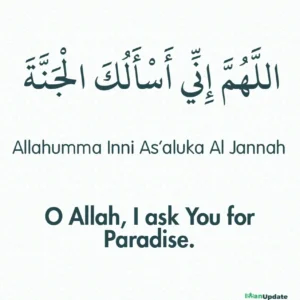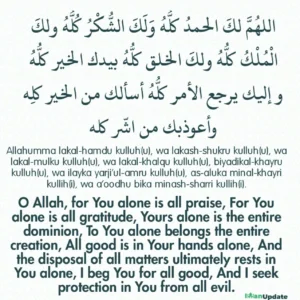Allahumma Aslih Li Deeni Full Dua in Arabic Text and Meaning

“Allahumma Aslih Li Deeni” is a wonderful prayer to ask Allah to improve our religious, worldly, and hereafter affairs. This dua is also a source of comfort for those who worry about the future. Let’s explore this dua further.
Allahumma Aslih Li Deeni in Arabic Text
The dua is written in Arabic as:
اللَّهُمَّ أَصْلِحْ لِي دِينِي الَّذِي هُوَ عِصْمَةُ أَمْرِي ، وَأَصْلِحْ لِي دُنْيَايَ الَّتِي فِيهَا مَعَاشِي ، وَأَصْلِحْ لِي آخِرَتِي الَّتِي فِيهَا مَعَادِي، وَاجْعَلِ الْحَيَاةَ زِيَادَةً لِي فِي كُلِّ خَيْرٍ وَاجْعَلِ الْمَوْتَ رَاحَةً لِي مِنْ كُلِّ شَرٍّ
Transliteration
Allahumma aslih li deenil-ladhi huwa ‘ismatu amri, wa aslih li dunya yal-lati fiha ma’ashi, wa aslih li aakhiratillati fiha ma’adi, waj-‘alil-hayata ziyadatan li fi kulli khayr, waj-‘alil mawta rahatan li min kulli sharr.
Allahumma Aslih Li Deeni Meaning in English
Allahumma aslih means O Allah, make my religion easy for me by virtue of which my affairs are protected, set right for me my world where my life exists, make good for me my Hereafter which is my resort to which I have to return, and make my life prone to perform all types of good, and make death a comfort for me from every evil.
RELATED: Allahumma Inni As Aluka Min Fadlika in Arabic and Meaning
Hadith Text
Abu Huraira reported that Allah’s Messenger (ﷺ) used to supplicate (in these words): ”
O Allah, set right for me my religion which is the safeguard of my affairs. And set right for me the affairs of my world wherein is my living. And set right for me my Hereafter on which depends my after-life. And make the life for me (a source) of abundance for every good and make my death a source of comfort for me protecting me against every evil.”
[Sahih Muslim 2720]

This saying of the Prophet Muhammad (peace be upon him) holds a powerful prayer, encompassing a comprehensive request from Allah for the rectification of three vital aspects: our religious life (Deen), worldly life (Dunya), and the hereafter (Akhirah).
He prayed: “O Allah, set right for me my religion which is the safeguard of my affairs.” This shows that the Prophet emphasized the rectification of religion first, as it is the foundation of our lives. If our religious practices are corrupted, it affects both our worldly life and our hereafter.
Requesting Allah for the rectification of religion involves following the teachings of the Qur’an and the Prophet Muhammad (peace be upon him), as well as the practices of the righteous predecessors.
This includes two important principles: sincerity in worshiping only Allah and following the Prophet’s guidance correctly.
By adhering to these principles, we safeguard ourselves from various evils and pitfalls that threaten our religion and worldly life, such as trials, tribulations, and misguidance.
The Prophet Muhammad (peace be upon him) further prayed: “And set right for me the affairs of my world wherein is my living.” This part of the dua asks Allah to rectify our worldly life, providing us with sufficiency, righteousness, and lawful provisions.
We seek from Allah a righteous family, pious offspring, a contented dwelling, and a safe and good life. This encompasses our worldly needs and desires, asking for blessings and goodness in all aspects of our lives.
The Prophet Muhammad (peace be upon him) said, “We will surely cause them to live a good life.” This promise assures believers of a fulfilling life in this world, filled with contentment, peace of mind, lawful sustenance, and success in righteous deeds.
He continued, “And set right for me my Hereafter on which depends my after-life.” Here, the Prophet asks Allah to grant success in righteous deeds that please Him, continuous obedience, and a good ending until the Day of Resurrection, ensuring ultimate success in the Hereafter and entry into paradise.
The Prophet also prayed, “…and make al-Hayat (i.e. my life) a means of increase for me in every good thing (khair)…” This means asking Allah to grant us a long life that serves as an opportunity to increase in good deeds, whether through speech or actions.
Therefore, a Muslim’s prolonged life should lead to increased righteous deeds, ultimately elevating their status in the Hereafter. This highlights the importance of using our time on Earth wisely to accumulate goodness and please Allah.
The Prophet Muhammad (peace be upon him) said, “…and make al-Mawt (i.e. my death) a means of rest for me from every evil (sharr).”
This means asking Allah to grant us rest and relief from the trials and tribulations of disobedience to Him and neglecting His commands and prohibitions when we depart from this world through death.
These words suggest that believers will find ultimate rest and safety when they meet their Creator, Allah, and will be successful in attaining His magnificent reward and eternal bliss.
This concise prayer beautifully encapsulates the principles of virtue in this world, our religious practices, and the Hereafter, highlighting the importance of seeking Allah’s mercy and guidance in every aspect of our lives.
We ask Allāh, the Most Generous, for His Favor!
[Taken from the book ‘Explanation of Comprehensive Supplications from the Sunnah of the Prophet by Shaykh Abdur-Razzāq ibn Abdul-Muhsin al-Badr]
Sheikh Ibn Uthaimeen explained that the Prophet Muhammad (peace be upon him) began his supplication by focusing on religion, saying:
“Allahumma Slihlee Deenee Alladhee huwa ‘Ismatu ‘Amree” which means, “O Allah, make my religion easy for me by virtue of which my affairs are protected.”
This implies asking Allah to make our religious practices sincere and correct, as religion serves as a shield against evil and enemies. Strengthening our religion protects us from various harms.
Improving our religion requires sincerity to Allah and following the Prophet Muhammad’s (peace be upon him) teachings. It’s important to note that associating partners with Allah or performing religious deeds for show undermines the validity of our religion.
Therefore, when we ask Allah to make our religion easy for us, we’re seeking sincerity and correctness in our worship.
The phrase “by virtue of which my affairs are protected” indicates that religion serves as a means of protection from evil and trials.
Moving on to the next part of the supplication, “Set right for me my world where my life exists,” acknowledges that our worldly life is temporary. Despite our transient existence, many before us have come and gone, leaving behind tales of their lives.
This reminds us of the impermanence of worldly wealth, status, and power. It encourages us to focus on building a meaningful life that aligns with our religious values and prepares us for the hereafter.
Today, we reflect on those who came before us—our scholars, colleagues, brothers, and fathers—and see them only in stories, as if they were never part of this world, mere dreams. Likewise, one day, we too will become tales.
The world is but a temporary resting place, not our permanent home. However, if we strive to do good in this life and make it beneficial for our Hereafter, it is truly commendable.
On the contrary, if one solely pursues worldly gain without consideration for the Hereafter, they lose not only in this life but also in the Hereafter—seeking refuge in Allah becomes imperative.
Therefore, the Prophet Muhammad (peace be upon him) emphasized, “where my life exists,” highlighting that this world is where we reside temporarily before passing away.
He prayed, “Make good for me my Hereafter which is my resort to which I have to return.” The Hereafter is our final destination, where every soul will eventually journey.
The goodness of the Hereafter lies in Allah saving us from the punishment of Hellfire and granting us entry into Paradise.
We ask Allah to grant us goodness in the Hereafter and to make our lives conducive to performing all types of good deeds, seeking comfort in death from every evil.
If someone receives help and support in this world, they will grow in goodness every day. They will engage in righteous deeds and feel the positive impact themselves.
You’ll notice their happiness when they perform good deeds, and they will say, “All the praises and thanks be to Allah, who has guided us to this and never could we have found guidance, were it not that Allah had guided us!” (Quran, Surah 7, verse 43).
Every day, they will progress: praying, praising Allah, reciting the Quran, encouraging good deeds, discouraging bad ones, greeting others warmly, and doing many other good acts.
When someone grows and develops positively in life, it’s considered a good life. As mentioned in a hadith: “The best of you is one who has a long life and good conduct.”
The Prophet Muhammad (peace be upon him) prayed that Allah would make death a refuge from all evils. Death marks the end of life, and the Prophet sought safety from the unknown challenges of life.
One may live a long life but deteriorate over time, facing corruption in their religion. They might encounter severe trials that lead them to wish they were never born or had died earlier, becoming forgotten.
But the death decreed by Allah provides safety from all evils. Therefore, the Prophet always prayed for a peaceful death. So, my brother, always remember and recite this supplication.
Dua Benefits
When we say this dua, we’re asking Allah to help us improve and strengthen our religious practices and beliefs. This includes seeking guidance to perform our acts of worship with sincerity and devotion, as well as to deepen our understanding of Islam.
This dua also encompasses seeking Allah’s assistance in our worldly matters, such as our education, career, relationships, and overall well-being.
By asking Allah to rectify our worldly affairs, we acknowledge His control over every aspect of our lives and seek His guidance in navigating through life’s challenges.
Furthermore, this dua is a supplication for success in the hereafter. We ask Allah to grant us forgiveness for our sins, increase our good deeds, and grant us entry into Paradise.
For those who worry about the future, this dua serves as a source of solace and hope. By placing our trust in Allah and seeking His help to rectify our affairs, we find peace in knowing that He is the ultimate provider and protector.







Ma cha Allah jazâkallah khayran
canadianpharmacymeds com
https://expresscanadapharm.com/# Express Canada Pharm
safe canadian pharmacies